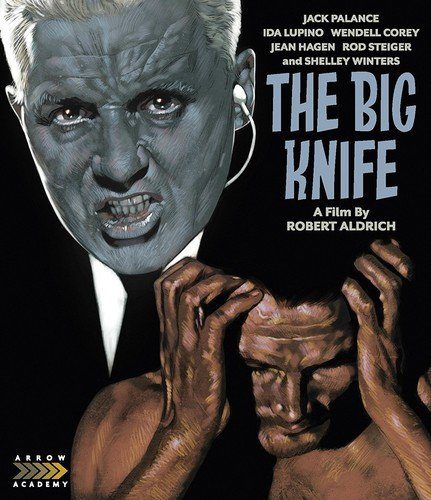
The Big Knife (1955) is several things at once. It’s a Hollywood movie about how awful Hollywood is. It’s a noir crime story where the studio boss is the gangster and the caper never quite gets off the ground. It’s a lurid melodrama with a larger than life central character who acts in larger than life overreactions right up to the end. And it’s quite obviously adapted from a stage play with not a whole lot in the way of (apparent) adapting going on.
It’s also, for fans of classic Hollywood glitz and classic Hollywood sleaze, a lot of fun. Jack Palance stars as Charles Castle, a movie idol who was once an idealistic stage actor, but compromised on those ideals when he signed up with Stanley Hoff (Rod Steiger), a low-brow movie producer who cares only about money and his personal prestige. You can tell that Charlie has a lot of wounded integrity because of his flowery speeches telling you so. His wife Marion (Ida Lupino) is leaving him, and probably going to marry a writer buddy of his that you know hasn’t sold out his integrity. You know it because he’s leaving California and heading back east.
That’s what the original writer of The Big Knife, Clifford Odets, did in the late ’40s after spending the better part of a decade writing for the pictures. The Big Knife was his poison pill for the industry, though Odets claimed it was really a universal condemnation of American Business. Maybe, but the business that specifically gets taken to the wringer here is Hollywood. Charlie is not just a man of big, compromised ambition, he’s got big, compromising habits which have gotten him in deep trouble. Especially related to a hit and run accident that sent his friend Buddy Bliss to jail – only Buddy wasn’t actually driving.
This secret is the lever that half of the world seems to have to use on Charlie, in particular studio boss Hoff. Hoff’s a mercurial figure who at once demands respect but then carries himself into wild emotional paroxysms, seething or weeping at the drop of a hat. And Rod Steiger is not, on the best of days, an actor given to subtlety. How much you’ll enjoy The Big Knife is probably proportional to how much you like scenery being chewed. In stark contrast is Hoff’s constant companion and studio fixer Smiley Coy. Played by Wendell Corey, his completely dry, stone-faced performance is the direct inverse of Steiger’s ranting megalomaniac, and it makes him seem all the more threatening. Hoff says he can destroy Charlie’s career if he wants to. Smiley will be the one who does the dirty work, and after a boozy late night conversation Charlie realizes just how dirty that can get when he’s asked to play a hand in one of Smiley’s schemes.
The Big Knife was directed by Robert Aldrich, of The Dirty Dozen, Kiss Me Deadly, and Whatever Happened to Baby Jane? fame. The stageplay was adapted by James Poe, who doesn’t do too much of the typical Hollywood adaptation trick of “opening up” the staged action. There are three scenes that don’t take place inside Charlie Castle’s living room, two of which could have been dispensed with without hurting the film a bit. The rest of the action goes round and round the couch, the bar and the sitting area of Castle’s expansive house. There’s a spiral staircase heading upstairs, and while Charlie climbs it three times (each time indicating the end of an act) we never follow him up there. For the rest of the film he fights his battles (or more often tries to evade them) from the confined space in that one room. It’s not for nothing that when friends come over for the evening, they watch one of Castle and Hoff’s cheesy boxing pictures. Charlie’s in the fight for his life.
Jack Palance gives a physical, hard-edged performance that, for me, was sometimes hard-pressed to meet the rather extravagant demands of Odets words. He seemed like he was trying to convince himself that he was a “poet-warrior”, instead of fully embodying it – though that actually might work better for the compromised character he is playing. For as much as The Big Knife is trying to stick it to Hollywood, this is a movie that just feels like old Hollywood, in performance, visually (it was shot in contrasty black and White) right up until the ending, which takes the movie’s atypical for classic Hollywood knowing cynicism right over the edge.
The Big Knife has been released on Blu-ray and DVD by Arrow Academy. The black and white image is often grainy as all hell, which might be a distraction for some, but overall I found the picture superb, and the sound was decent though it showed the film’s age. The extras on the disc include an excellent full length commentary by Glenn Kenny and Nick Pinkerton which is academic in the best sense: chock full of information with a lively presentation. There’s also a short contemporary promo about the film, and an interesting 30 minute short Bass on Titles. Made by Saul Bass, the famed title designer who created The Big Knife‘s credit sequence and many other famous ones, it’s an overview of his work and the ideas behind it. The booklet includes a pair of essays, one directly on The Big Knife by Nathalie Morris, and an article reprinted from Sight & Sound about Odets in Hollywood.